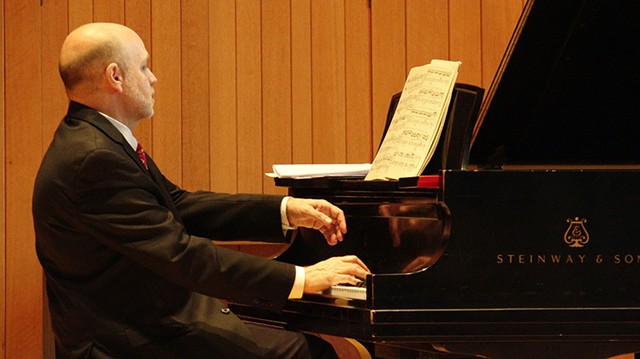
- Courtesy
- Paul Orgel
If Vermonters haven't seen Paul Orgel in concert, a rare opportunity comes this Sunday, October 8. The pianist has performed everywhere from the Kennedy Center in Washington, D.C., to major venues in China, but these days his public appearances center on his annual recital at the University of Vermont. Orgel, 68, has been an affiliate artist at the university since 1998 — making this his 25th faculty recital.
Not that he's counting.
"The 25th anniversary was sort of an after-realization," the Shelburne pianist said with a chuckle when asked how he chose the program for such an occasion. Instead, he had his audience in mind. "I just wanted to play things that will make people happy to be at the concert," he said.
The early Romantic pieces that begin and end the program are a guarantee in that regard. Robert Schumann's Arabesque in C Major, Op. 18, the opener, is a gentle, swirling piece in the soothing key of C that explores both consternation and longing. (Orgel recorded himself playing it at home; the video is on his YouTube channel.)
The finale is Frédéric Chopin's showstopper Andante Spianato and Grande Polonaise Brillante in E-flat Major, Op. 22. The piece moves from an introductory "smooth" (spianato) part to a Polish dance in triple time whose impossibly fast runs only seem to accelerate toward the end. Orgel recently finished recording all 21 of Chopin's nocturnes for his YouTube channel — a four-year project.
The program's anchor piece shifts to the baroque era: Johann Sebastian Bach's Partita No. 6 in E Minor, BWV 830. A partita is a suite of shorter pieces, often dances; this one opens with a toccata, designed to show off the "touch" of the pianist. Bach wrote for the clavichord and harpsichord, before the piano gained its sustaining pedal; a certain exactitude of touch is required in its absence. While Orgel is no purist — he has used the pedal sparingly in past performances of Bach — he has precision in abundance. He studied piano performance for his bachelor's at New England Conservatory, master's at Boston University and doctorate at Temple University.
While his teaching is limited to one-on-one coaching of UVM and private piano students rather than classes, Orgel has explored the pairing of Bach and Chopin pedagogically before. In 2019 he collaborated with James Stewart at Vermont Public to create a mini-lecture for radio and internet, titled "Alchemy of Genius: A J.S. Bach and Chopin Pairing" — an insightful look into how both composers, a century apart, approached the same keys in complementary ways.
The program's fourth work is Béla Bartók's Suite, Op. 14. It was written in 1916, Orgel pointed out, "but it has the feel of something modern: It has a certain dissonant quality, and it's intensely rhythmic." The Hungarian composer is best known for conducting field recordings of traditional folk songs and incorporating them into his music, but the Suite is his own original composition.
Orgel will give his take on each of these works at a free talk three days before the concert, both at the UVM Recital Hall. He would do it during or just before his performance, he said, but explaining and playing "use different parts of your brain."









Comments
Comments are closed.
From 2014-2020, Seven Days allowed readers to comment on all stories posted on our website. While we've appreciated the suggestions and insights, right now Seven Days is prioritizing our core mission — producing high-quality, responsible local journalism — over moderating online debates between readers.
To criticize, correct or praise our reporting, please send us a letter to the editor or send us a tip. We’ll check it out and report the results.
Online comments may return when we have better tech tools for managing them. Thanks for reading.